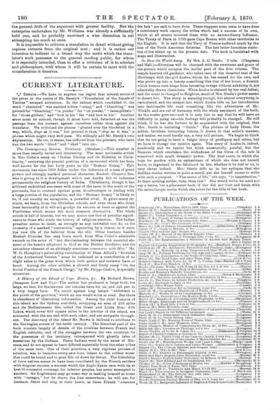So Runs the World Away. By Mrs. A. C. Steele.
3 vols. (Chapman and Hall.)—Everyone will be charmed with the sweetness and grace of the picture which occupies the earlier part of the first volume. The simple-hearted old gardener, who takes care of the deserted seat of the Mowbrays, with the girl Azalea, whom he has reared for his own, and who grows up into a beauty something like that of her home, a domain which human care keeps from becoming savage without subduing it, are admirably-drawn characters. When Azalea is claimed by her real father, and the scene is changed to Brighton, much of Mrs. Steele's power seems- to desert her. The story is amusing enough, but almost everything is caricatured, and the serapes into which Azelea falls on her introduction into fashionable life read something like the adventures of Mr. Winkle, and are out of harmony with the whole sentiment of the book. As the reader goes on—and it is only fair to say that he will have no. difficulty in going on—his feelings will probably be changed. He will think, if he has the fortune to be acquainted with the original, that Mrs. Steele is imitating "Oujda." The picture of Lady Diana, the selfish, faithless, intriguing beauty, is drawn in that artist's manner,. and makes, we need hardly say, a very evil picture. We begin to think that we are going to have a vulgar story of profligacy and crime, but we have to change our opinion again. The story of Azalea is, indeed, needlessly, and we cannot but think unnaturally, painful, but the Nemesis which overtakes the wickedness of the Circe of the tale is conceived with much dramatic power. The final scene, in which she begs for pardon with an earnestness of which she does not herself know, so ingrained is the falsehood in her, whether it be real or no, is very clever indeed. Mrs. Steele tells us in her epilogue that she dislikes stories written to point a moral, yet she herself seems to write with such a purpose. "The motto of life," she says, "is imperfection." Is there nothing nobler, then, than this ? She would write, we need not say a better, but a pleasanter book, if she did not start and finish with the misanthropic motto which she takes for the title of her book.


































 Previous page
Previous page